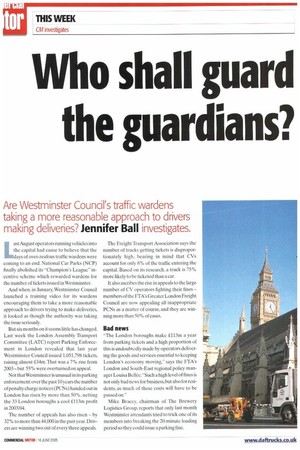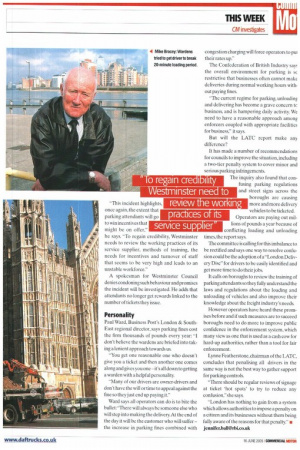Who shall guard the guardians?
Page 34

Page 35

If you've noticed an error in this article please click here to report it so we can fix it.
Are Westminster Council's traffic wardens taking a more reasonable approach to drivers making deliveries? Jennifer Ball investigates.
Last August operators running vehicles into the capital had cause to believe that the days of over-zealous traffic wardens were coming to an end. National Car Parks (NCP) finally abolished its "Champion's League" incentive scheme which rewarded wardens for the number of tickets issued in Westminster.
And when, in January, Westminster Council launched a training video for its wardens encouraging them to take a more reasonable approach to drivers trying to make deliveries, it looked as though the authority was taking the issue seriously.
But six months on it seems little has changed. Last week the London Assembly Transport Committee (LATC) report Parking Enforcement in London revealed that last year Westminster Council issued 1.051,798 tickets, raising almost £34m. That was a 7% rise from 2003 —but 55% were overturned on appeal.
Not that Westminster is unusual in its parking enforcement: over the past 10 years the number of penalty charge notices (PCNs) handed out in London has risen by more than 50%, netting the 33 London boroughs a cool £113m profit in 2003/04.
The number of appeals has also risen — by 32% to more than 44,000 in the past year. Drivers are winning two out of every three appeals. The Freight Transport Association says the number of trucks getting tickets is disproportionately high, bearing in mind that CVs account for only 8% of the traffic entering the capital. Based on its research, a truck is 75% more likely to be ticketed than a car.
It also ascribes the rise in appeals to the large number of CV operators fighting their fines — members of the ETA's Greater London Freight Council are now appealing all inappropriate PCNs as a matter of course, and they are winning more than 50% of cases.
Bad news
-The London boroughs make £113m a year from parking tickets and a high proportion of this is undoubtedly made by operators delivering the goods and services essential to keeping London's economy moving," says the ETA's London and South-East regional policy manager Louisa Bellee."Such a high level of fines is not only bad news for business,but also for residents, as much of these costs will have to be passed on."
Mike Bracey, chairman of The Brewery Logistics Group, reports that only last month Westminster attendants tried to trick one of its members into breaking the 20-minute loading period so they could issue a parking fine. "This incident highlights, once again, the extent that parking attendants will go to win incentives that might be on offer," he says. "To regain credibility, Westminster needs to review the working practices of its service supplier, methods of training, the needs for incentives and turnover of staff that seems to be very high and leads to an unstable workforce."
practices o its service supp ier
A spokesman for Westminster Council denies condoning such behaviour and promises the incident will be investigated. He adds that attendants no longer get rewards linked to the number of tickets they issue.
Personality Paul Ward, Business Post's London & SouthEast regional director, says parking fines cost the firm thousands of pounds every year: "I don't believe the wardens are briefed into taking a lenient approach towards us.
"You get one reasonable one who doesn't give you a ticket and then another one comes along and gives you one -it's all down to getting a warden with a helpful personality.
"Many of our drivers are owner-drivers and don't have the will or time to appeal against the fine so they just end up paying it."
Ward says all operators can do is to bite the bullet-There will always be someone else who will step into making the delivery. At the end of the day it will be the customer who will suffer the increase in parking fines combined with congestion charging will force operators to pui their rates up."
The Confederation of British Industry say the overall environment for parking is sc restrictive that businesses often cannot makc deliveries during normal working hours without paying fines.
"The current regime for parking, unloading and delivering has become a grave concern tc business, and is hampering daily activity. We need to have a reasonable approach among enforcers coupled with appropriate facilities for business," it says.
But will the LATC report make any difference?
It has made a number of recommendations for councils to improve the situation, including a two-tier penalty system to cover minor and serious parking infringements.
The inquiry also found that confusing parking regulations and street signs across the boroughs are causing more and more delivery vehicles to be ticketed. Operators are paying out millions of pounds a year because of conflicting loading and unloading times, the report says.
The committee is calling for this imbalance to be rectified and says one way to resolve confusion could be the adoption of a"London Delivery Disc" for drivers to be easily identified and get more time to do their jobs.
It calls on boroughs to review the training of parking attendants so they fully understand the laws and regulations about the loading and unloading of vehicles and also improve their knowledge about the freight industry's needs.
However operators have heard these promises before and if such measures are to succeed boroughs need to do more to improve public confidence in the enforcement system, which many view as one that is used as a cash cow for hard-up authorities, rather than a tool for fair enforcement.
Lynne Featherstone,chairman of the LATC, concludes that penalising all drivers in the same way is not the best way to gather support for parking controls.
"There should be regular reviews of signage at ticket 'hot spots' to try to reduce any confusion," she says, "London has nothing to gain from a system which allows authorities to impose a penalty on a citizen and its businesses without them being fully aware of the reasons for that penalty.• jennifer.ballOrbi.co.uk








































































































































































































